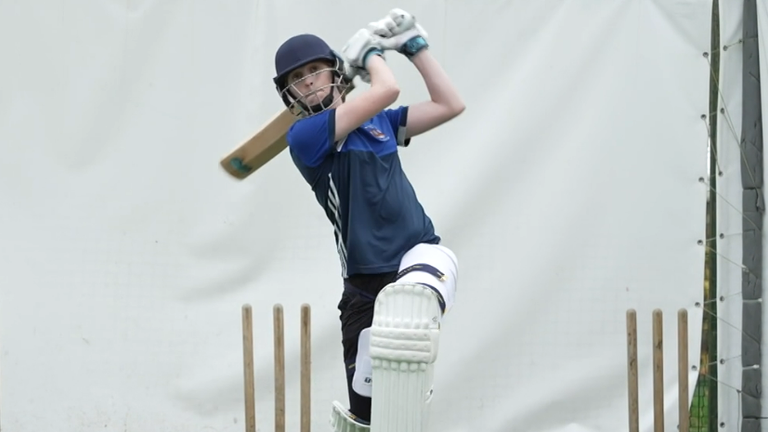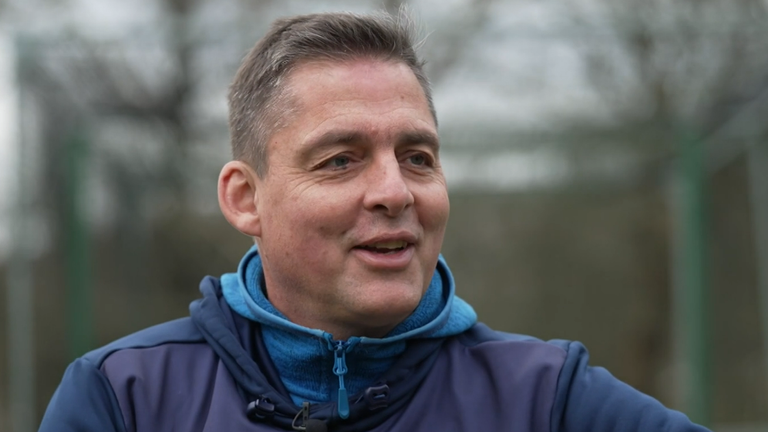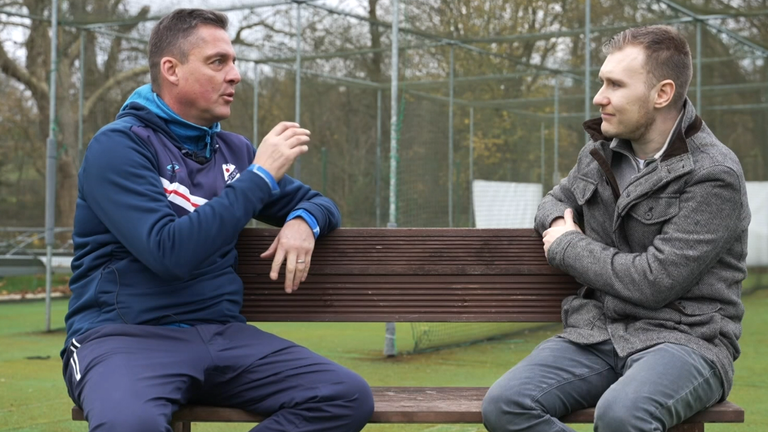Amelia Short: My transgender story and how my inclusive local cricket club helped me
Amelia Short spoke to Sky Sports News about her journey, allyship, and how cricket should be an inclusive environment; Short believes the ability to practise her favourite sport is a human right, and therefore also a right of transgender athletes
Tuesday 6 February 2024 14:47, UK
Amelia Short is an 18-year-old in love with cricket who plays at Warrington Cricket Club in Cheshire. From the age of nine, she knew cricket was the sport for her. A year ago she realised she was transgender and questioned whether the sport would accept her for who she was.
She spoke to Sky Sports News about her journey, allyship, and how cricket should be an inclusive environment.
Short was unsure of the reaction she would get from those in the sport in her local area during a difficult part of her life. She told Nick Ransom: "It was coming up to my eighth season of cricket when I started questioning. It was a tough period. I did not know how it would affect me in sport or socially.
"I was quite nervous in pre-season. I didn't know what to do. I didn't know who to tell," said Short, who is happy with any pronouns being used while she is in the early stages of transitioning.
Short had been experiencing gender dysphoria. This term describes the discomfort or distress a person experiences when there is a mismatch between their sex assigned at birth and their gender identity.
Prior to her transition, Short's mother described her as "completely miserable, all the time."
Her mother told Sky Sports News: "When she told me, I was just really relieved that finally we had an answer as to why she was so unhappy. That meant we could move forward and get the really important gender dysphoria diagnosis."
Short faced an excruciatingly long wait of four years for her initial NHS assessment, so had little choice but to pursue treatment privately; an all-too-common experience for trans people in the UK.
"I've been on hormone therapy for six months. It's only a small percentage of the actual journey … but it's giving me hope that in the future I'll be happier and more accepting my own body. I have plans for surgery too which would just make me feel more comfortable."
While hormone therapy will hugely improve Short's quality of life, it didn't come without concerns about how it would impact her as a cricketer.
"I was always unsure on how it would affect my performance. Am I going to lose what I have? It took me a while to get round to it, but I realised in the end that it's all irrelevant."
To be able to enjoy cricket to the fullest, though, Short did not have to worry about hiding her true self.
"As we got close to the cricket season, I realised that it was important for myself to express who I really am and tell people that this is who I am. Transitioning is the best way forward for me," said Short.
However, the idea of 'coming out' was simultaneously anxiety-inducing as she felt the reaction from members of her local cricket was unpredictable.
"I started off by telling my closest team-mate who I knew well outside of cricket. After I spoke to her, I knew that I was in good hands and knew that talking to the rest of the team would be relatively easy and everyone would be just as accepting as she was."
Moving beyond her immediate circle, there was one person in the club that Short knew she could rely on and he would be one of the first she shared her news with.
Her lifelong coach, Tom Jones, who had made her feel so welcome in her first cricket lesson, once again provided the support she needed and more.
"Tom was really honest and very accepting of what I'm going through. He said he will be there for every step that I'm going through at cricket.
"Every game, he makes sure that we have a proper changing room situation. If we're at a home game, I'll have my own changing room. If we're at an away game, he'll be there to speak to the opposition coach or captain and ask for an extra room where I can get changed."
Jones, a coach at Warrington Cricket Club, said, "What struck me was just how incredibly brave this individual was to make that decision and also include me as part of that trusted adult network.
"There's been no pressure applied to me or anyone else from Shorty about pronouns. There's not been any pressure regarding what's correct, what's not. But what I've been absolutely adamant about is understanding how that matters to him. So if that were to change, then I would make sure that I'd be the first person to let people know this is what needs to be addressed and respected."
In standing up for, supporting and encouraging Short, Jones showed her Warrington Cricket Club's commitment to inclusion, while also setting an example to the rest of the club.
"Everyone has been great. They were all really accepting," Short said.
"What's most important is that they just see me as another person. It's not about the fact that I'm transitioning. It's the fact that I'm a person who wants to play cricket."
She emphasised that, if trans people are to feel a sense of belonging in cricket, such awareness, understanding and empathy from others is essential.
Short's mother said: "Everyone is a human being. The rest of it doesn't matter. We're all supposed to look out for each other."
This allyship and acceptance from her cricket club and family is also something Short does not take for granted in cricket and beyond.
Recently the International Cricket Council announced that trans women have been banned from international women's cricket.
This means any trans women who have undergone male puberty are ineligible in the international women's game, regardless of any surgery or gender reassignment treatment they may have undertaken.
Short's story of inclusion comes with limits. She said: "[Transgender Inclusion] is dying and it's going quick. Every day now seems like another sport is closing its doors, whether it be international, county, or grassroots. It's upset me."
Danielle McGahey is an Australian-born cricketer who made the headlines as the first transgender person named in an international squad. She made her debut last year for Canada and scored 118 runs in six T20 World Cup qualifying matches at an average of 19.66.
"I'm feeling for Danielle dearly because it's [the ICC decision] definitely not come at the right time. There's a lot of trans awareness going on recently and the fact that they've just done it now feels quite targeted," said Short.
"It really does show a need for more evidence for these harsh calls," said Short.
She believes the ability to practise her favourite sport is a human right, and therefore also a right of transgender athletes.
She feels the burden of proof rests on those who seek to exclude trans women from this human right. Short does not agree with the ICC policy. However, under ECB policy for Short and others, they are able to play their favourite sport at grassroots and recreational level across the country. They are also able to play mixed-gender matches for their clubs.
The ECB say they fully support trans people and their right to play cricket and to ensure they are treated with dignity, fairness and respect by the ECB, all clubs and their employees; and that they will be met with an open and inclusive environment so they can play cricket in the way in which they feel most comfortable.
For Short, Warrington CC remains a place to thrive, thanks to allyship from family, friends and staff.
Her story demonstrates the sheer joy cricket can provide in an inclusive environment.





